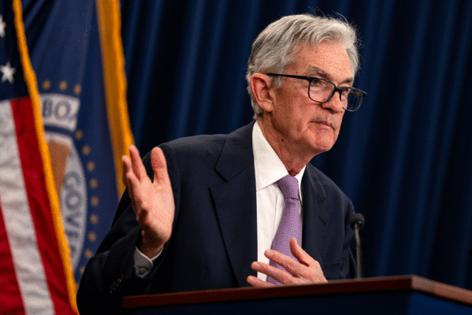Editorial: Why are interest rates rising while the Federal Reserve is cutting? Trump deficit worries could be at work
Published in Political News
An odd thing was happening in the run-up to Tuesday’s election that few apart from compulsive market watchers were noticing but now looms large in the wake of former President Donald Trump’s election to a second term.
Over the past 60 days or so, interest rates consumers pay for mortgages, auto loans and credit cards have risen substantially even as the Federal Reserve took a cleaver to the rates it controls back in September and, as widely expected, cut those rates by another quarter point on Thursday.
As of Thursday the average rate on a 30-year, fixed rate mortgage was 6.79%, up from 6.08% as of Sept. 26, just after the Fed’s half-point interest rate cut, according to Freddie Mac’s national survey.
What explains this disparity between the Fed’s actions and the rates actual consumers pay? The market. In that time frame, bond investors have relentlessly bid up yields on 10- and 30-year U.S. Treasury bonds, which are closely correlated to mortgage and auto rates. Consumer rates in turn have followed.
And what does the market’s behavior tell us? Fed Chairman Jerome Powell said Thursday that central bankers had noted the “run-up in bond rates.” Asked directly about deficits, he was careful not to opine on fiscal policy and said it was too early to draw big conclusions. “It appears the moves are not principally about higher inflation expectations,” he said. He did assert, as he’s said repeatedly, that the soaring national debt threatens the health of the economy over the long term and should be addressed as soon as possible.
It’s the Fed chairman’s job to be ultra-cautious in his musings, but we suspect these recent market moves indeed are noteworthy. We worry they say that federal fiscal policy is out of whack and — given the election results — likely to get even more so. In the fiscal year that ended Sept. 30, the federal government ran a deficit of $1.8 trillion. Fully 27% of federal spending was put on the national credit card. And that was in a year in which there was no recession and the nation wasn’t at war.
As we’ve written before, the nation’s reliance on deficit spending is unsustainable and headed for an unpleasant moment of reckoning. Without a change in course, there will come a time when investors’ faith in the nation’s ability or willingness to honor its debts erodes to the point that federal borrowing becomes inordinately expensive or the government struggles to find buyers for its IOUs at any price.
Hard to imagine? Of course. People warning of profligate spending have long been called, and sometimes mocked as, “deficit scolds.” But the most obvious explanation to us of the divergence between the Fed and the markets is sapped confidence in the nation’s fiscal direction.
This is where the election results come in. Trump’s economic agenda — focused on tariffs and eliminating taxes on overtime pay, tips, Social Security benefits, as well as tax cuts for corporations and those paying high state and local taxes — by all accounts would drive the deficit far higher. Most nonpartisan commentators also saw Harris’ campaign promises also as likely contributors to the deficit, but, assuming he actually does what he said he will do, Trump’s promises were yet more reckless in this regard.
His kind of a budget easily could send interest rates even higher, making it that much harder for ordinary Americans to buy a home or even a car, one of the chief complaints of those who “voted with their pocketbooks” when they backed Trump.
Making matters worse for those pocketbook voters, Trump’s tariffs, if imposed as broadly as he proposed during the campaign, will raise consumer prices, potentially restarting the inflationary machine that made voters so grumpy when they considered their electoral choices.
None of this is to say that the Biden administration has performed admirably when it comes to fiscal policy. The trillions in federal spending launched early in his term, only some of which was necessary to soften the pandemic blow, contributed to the inflation that crippled the Democrats politically and now is keeping interest rates elevated. President Joe Biden made an enormous political mistake embracing the “Bidenomics” tagline. That became a punch line for too many voters and gave them an easy narrative for whom to blame.
A $1.8 trillion deficit in an era in which jobs and the economy are growing and there is no crisis or shock requiring a federal response is inexcusable. Neither party even acknowledged the fiscal concerns — not seriously anyway — let alone proposed to do anything about them during the election.
Now that Trump has won office, there are signs the financiers who have his ear realize their conundrum. There’s talk now of keeping the tax-cut promises Trump doled out like Halloween candy only for those under certain income levels.
Good luck trying to limit Trump’s signature “no taxes on tips” promise in that fashion. If tipped income is shielded from taxes, the policy will be a nightmare to implement and enforce even without such income limits, given the manifold possibilities for manipulation.
At the end of the day, with the White House, the Senate and (likely) the House all in GOP hands, it may have to be the market that puts the brakes on profligacy.
_____
©2024 Chicago Tribune. Visit chicagotribune.com. Distributed by Tribune Content Agency, LLC.




























































Comments